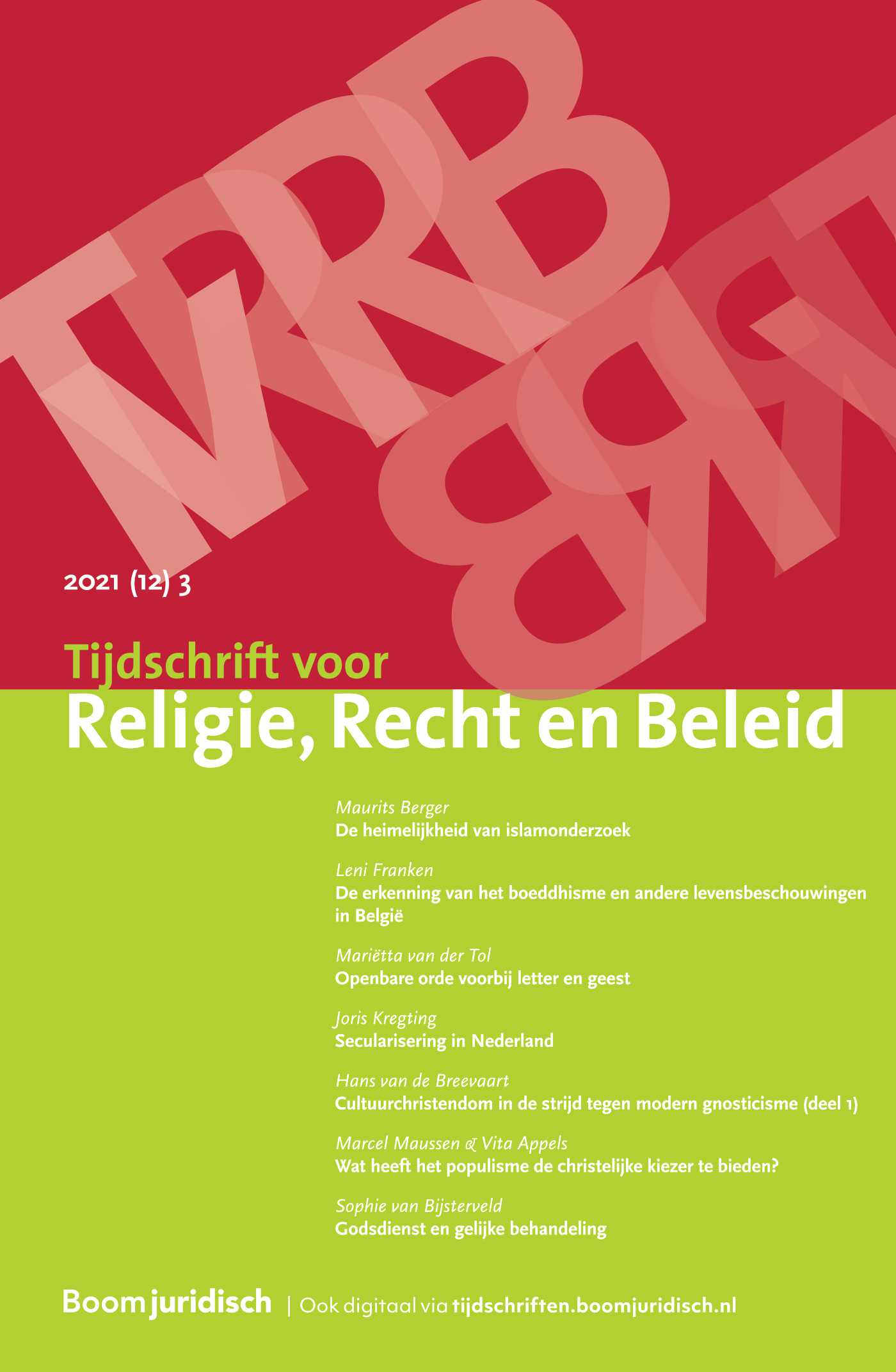|
Certain radical public acts of expression, those which for instance incite hatred or recruit participants for armed conflict, are punishable under criminal law, even when these pronouncements are religiously motivated. This study examines which statements incur punishment, and the role freedom of religion and freedom of expression play when making this assessment. |


Tijdschrift voor Religie, Recht en Beleid
Meer op het gebied van Algemeen
Over dit tijdschriftMeld u zich hier aan voor de attendering op dit tijdschrift zodat u direct een mail ontvangt als er een nieuw digitaal nummer is verschenen en u de artikelen online kunt lezen.
| Redactioneel |
|
| Auteurs | Hans-Martien ten Napel |
| Auteursinformatie |
| Artikel |
|
| Trefwoorden | Freedom of religion, freedom of speech, Fundamentalism, Jihadism |
| Auteurs | Mr. dr. Aernout Nieuwenhuis |
| SamenvattingAuteursinformatie |
| Artikel |
|
| Trefwoorden | dissenting opinions, freedom of religion, margin of appreciation, ECHR |
| Auteurs | Prof. dr. Sophie van Bijsterveld |
| SamenvattingAuteursinformatie |
|
Religion cases of the European Court of Human Rights are much commented on. A systematic analysis of dissenting opinions in religion cases, however, does not exist. Such analysis can shed light on dividing lines within the ECtHR and deepen our understanding of the methods of reasoning of the ECtHR itself. This article contains analysis of dissenting opinions in the rulings of the Grand Chamber in religion cases. The analysis shows a pattern in the dividing lines. Contrary to the prior expectation, the margin of appreciation as such forms no such dividing line. The article discusses and evaluates the findings. |
| Artikel |
|
| Trefwoorden | German occupation, social work, Nazism, Churches |
| Auteurs | Dr. Ben Koolen |
| SamenvattingAuteursinformatie |
|
Some months after the German occupation of the Netherlands, the Reichskommissar inroduced a Germanlike system of collecting finances for the poor people, soon followd by an equal system of social work. These initiatives at the same time aimed at urge the national-socialistic ideology, as such dismissed by the society and the churches. The occupying authorities avoided a clash with the churches. |
| Artikel |
|
| Trefwoorden | Theology, religious studies, theological faculties, ministry formation |
| Auteurs | Dr. Gerrit Immink |
| SamenvattingAuteursinformatie |
|
The Dutch universities founded in the 16th and 17th century were public state universities with theological faculties. During the 19th century the debate about the status of theology as an academic discipline resulted in the so-called duplex ordo arrangement: the public state university followed the design of religious studies and the ‘ecclesial chairs’ in the university (systematic and practical theology) followed a Christian perspective. In the last two decades a major shift has taken place: many faculties of theology were closed and new arrangements for the academic education of the ministry were created. This article describes these developments. |
| Artikel |
|
| Auteurs | Prof. dr. Marcel Chappin en Prof. dr. Paul van Geest |
| Auteursinformatie |
| Artikel |
|
| Trefwoorden | religie (religieuze argumenten), Tolerantie, Publieke ruimte, Debat |
| Auteurs | Drs. Rien Fraanje |
| SamenvattingAuteursinformatie |
|
The American philosopher Martha Nussbaum and the former Archbishop of the Anglican Church Rowan Williams both published a book three years ago pleading for room for religion in the public arena. Nussbaum makes use of, mainly, liberal arguments, whereas Williams has drenched his argument with Christian-social notions such as pluriformity, sovereignty and human connectedness. Nussbaum, on the one hand, argues that religious arguments must not be banished from the public arena. Williams, on the other hand, holds that religious arguments and stories must be heard in the public arena. Nussbaum offers clues for christian-social political parties to connect with secular parties that claim to liberal. |

 Aflevering 3
Aflevering 3